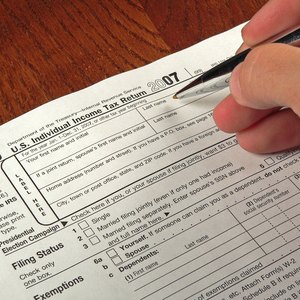
Filling out and filing income tax paperwork is cumbersome, especially if it isn't necessary. Depending on their age, gross income and filing status, some individuals might not have to file taxes.
Age
Taxpayers who are 65 or older on December 31 have higher gross income limits before they are required to file taxes. For example, in 2012 single people under age 65 must file taxes if their gross income is $9,750 or more, while people over 65 must file if their gross income is $11,200 or more.
Gross Income
Gross income, as defined by the Internal Revenue Service (IRS), is any non tax-exempt income received, whether in the form of money, goods, property or services. It includes income earned outside the United States, as well as income from the sale of a main home. The income limit for filing taxes ranges from $3,800 for a married person of any age filing separately to $21,800 for a married couple over age 65 filing jointly.
Filing Status
A taxpayer’s filing status can be single, married filing jointly, married filing separately, head of household or qualifying widow/widower with dependent child. Each of these categories has different income limits, which are outlined in IRS Publication 17.
Expert Insight
Even if you are exempt from filing income tax because of your age, income or filing status, you may still want to go ahead and file. Why? Because you may be eligible to receive a tax refund.
References
- Internal Revenue Service: Publication 17
- Internal Revenue Service. "Publication 501: Dependents, Standard Deduction, and Filing Information (2018)," Page 5. Accessed Dec. 11, 2019.
- Internal Revenue Service. "Choosing the Correct Filing Status." Accessed Dec. 11, 2019.
- Internal Revenue Service. "Publication 501: Dependents, Standard Deduction, and Filing Information (2018)," Pages 5 & 6. Accessed Dec. 11, 2019.
- Internal Revenue Service. "Answers to Frequently Asked Questions for Registered Domestic Partners and Individuals in Civil Unions." Accessed Dec. 11, 2019
- Internal Revenue Service. "Publication 501: Dependents, Standard Deduction, and Filing Information (2018)," Pages 8–10. Accessed Dec. 11, 2019.
- Internal Revenue Service. "IRS Provides Tax Inflation Adjustments for Tax Year 2019." Accessed Dec. 11, 2019.
- Internal Revenue Service. "Publication 501: Dependents, Standard Deduction, and Filing Information (2018)," Page 7. Accessed Dec. 11, 2019.
- Internal Revenue Service. "Revenue Procedure 2018-57," Pages 9 & 10. Accessed Dec. 11, 2019.
- Internal Revenue Service. "Publication 501: Dependents, Standard Deduction, and Filing Information (2018)," Page 8. Accessed Dec. 11, 2019.
- Internal Revenue Service. "Publication 501: Dependents, Standard Deduction, and Filing Information (2018)," Pages 9 & 10. Accessed Dec. 11, 2019.
- Internal Revenue Service. "Publication 501: Dependents, Standard Deduction, and Filing Information (2018)," Page 9. Accessed Dec. 11, 2019.
Writer Bio
Stacey Schifferdecker has worked as a professional writer since 1989. She holds a Master of Arts degree in English from Oklahoma State University. Schifferdecker has written and edited user guides, newsletters, brochures, curriculum, proposals, web copy, and ebooks.

